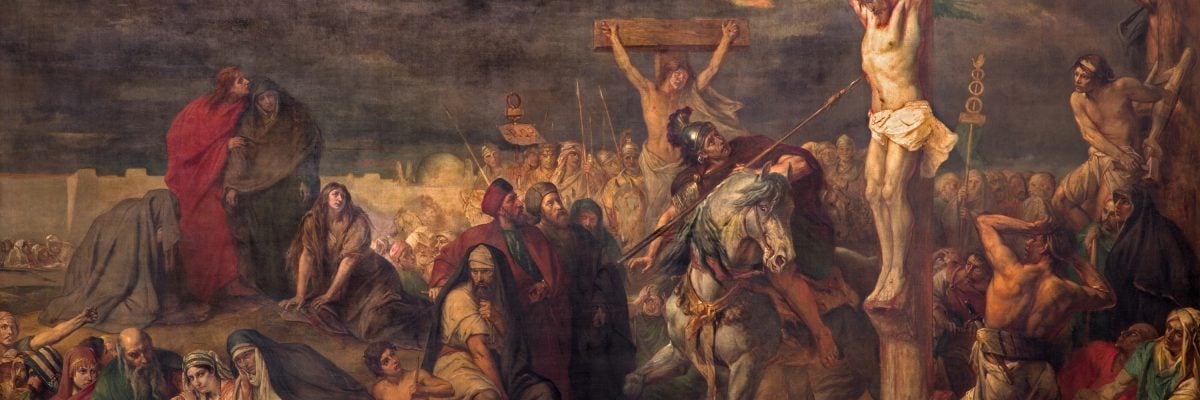
No Christian I know would deny that some doctrines are more or less clear than others in Scripture. But when it comes to the atonement of Christ, Scripture is remarkably clear: Jesus Christ died on the cross for the entire world. The redemption that Christ merited through his passion and death was for every single human person who has ever and will ever live.
The Calvinist teaching of “limited atonement” denies this simple truth. We find this teaching in the Calvinist confessions’ emphasis on the sacrifice of Christ being only for the sins of the elect and not for the sins of the whole world. The Westminster Confession of 1643, for example, declared:
In this sacrament Christ is not offered up to his Father, nor any real sacrifice made at all for remission of sins of the quick or the dead; but only a commemoration of that one offering up of himself, by himself, upon the cross, once for all, and a spiritual oblation of all possible praise unto God for the same; so that the Popish sacrifice of the mass, as they call it, is most abominably injurious to Christ’s one only sacrifice, the alone propitiation for all the sins of the elect (emphasis added).
Notice, Christ’s sacrifice was not offered for the sins of all but only for the elect, according to John Calvin and the Westminster Confession. I am always astonished at this teaching in light of the clear teaching in I John 2:1-2:
My little children, I am writing this to you so that you may not sin; but if any one does sin, we have an advocate with the Father, Jesus Christ the righteous; and he is the expiation for our sins, and not for ours only but also for the sins of the whole world (emphasis added).
As Catholics, we have to go with St. John over John Calvin. Yet Calvin was quite insistent that Christ did not die for all. He taught:
By predestination we mean the eternal decree of God, by which he determined with himself whatever he wished to happen with regard to every man. All are not created on equal terms, but some are preordained to eternal life, others to eternal damnation; and accordingly, as each has been created for one or other of these ends, we say that he has been predestined to life or to death (The Institutes of the Christian Religion, bk. 3, ch. 21, para. 5).
This is the essence of Calvin’s notion referred to commonly as “double predestination.” To be clear here, for Calvin and true Calvinists, predestination means that God positively wills that some go to heaven and some go to hell. Before each man is ever born, God has already decreed and ordained the eternal torment of those chosen for damnation. Calvin said:
Those, therefore, whom God passes by he reprobates, and that for no other cause but because he is pleased to exclude them from the inheritance which he predestines to his children (ibid., ch. 23, para. 1, emphasis added).
If the Calvinist notion of predestination were true, this doctrine of limited atonement would follow. If God’s eternal decree representing his will from all eternity is that only some be saved, and if his immutable will is for some to go to hell, then clearly, he did not die on the cross for the salvation of all. This follows necessarily.
This is a case of a presupposition based on the misunderstanding of a relatively few biblical texts that ends up contradicting the plain teaching of Sacred Scripture elsewhere. The atonement of Christ on the cross is the greatest expression of God’s salvific will for all of mankind. And Scripture could not make it any plainer:
John 3:16: For God so loved the world that he gave his only Son, that whoever believes in him should not perish but have eternal life. For God sent the Son into the world, not to condemn the world, but that the world might be saved through him.
Notice, the text does not say, “God so loved the elect…”
I Tim. 2:3-6: This is good, and it is acceptable in the sight of God our Savior, who desires all men to be saved and to come to the knowledge of the truth. For there is one God, and there is one mediator between God and men, the man Christ Jesus, who gave himself as a ransom for all (emphasis added).
Here we see—contrary to the Calvinist teaching of a limited atonement—that Christ died for all, revealing God’s positive salvific will for all to be saved.
II Peter 3:9: The Lord is not slow about his promise as some count slowness but is forbearing toward you, not wishing that any should perish, but that all should reach repentance (emphasis added).
Not only is it God’s positive will that all be saved, but he also, and very clearly, does not will any to perish in the fires of hell. Again, Calvinism is expressly contrary to this is. The biblical text reveals God’s salvific will to include each and every human being that has ever or will ever live. Those who end up in hell will do so because they chose to reject the truth, not because of any willing on God’s part.
The Catechism of the Catholic Church presents the biblical truth of the matter succinctly in paragraph 1037:
God predestines no one to go to hell; for this, a willful turning away from God (a mortal sin) is necessary, and persistence in it until the end. In the Eucharistic liturgy and in the daily prayers of her faithful, the Church implores the mercy of God, who does not want “any to perish, but all to come to repentance” (citing II Peter 3:9).
Calvin responds
I actually enjoy reading John Calvin’s magnum opus, Institutes of the Christian Religion. I love the way Calvin’s mind works. Give me Calvin to read any day over Luther. Luther is all over the place with his theology. Calvin is disciplined, thorough, consistent, and easy to understand. Don’t get me wrong; he is profoundly wrong on many crucial matters, but at least you know where he stands.
When it comes to Calvin’s responses to the above-mentioned texts, well, let’s just say they are disciplined, consistent, easy to understand, and dead wrong. For brevity’s sake, here we will take only I Timothy 2:4. Let’s cite verses 1-6 for context:
First of all, then, I urge that supplications, prayers, intercessions, and thanksgivings be made for all men, for kings and all who are in high positions, that we may lead a quiet and peaceable life, godly and respectful in every ways. This is good, and it is acceptable in the sight of God our Savior, who desires all men to be saved and to come to the knowledge of the truth. For there is one God, and there is one mediator between God and men, the man Christ Jesus, who gave himself as a ransom for all…
This text is quite plain, making clear that:
1. God wills all men to be saved.
2. Christ Jesus “gave himself as a ransom for all.”
But listen to Calvin’s response: “By this he assuredly means nothing more than that the way of salvation was not shut against any order of men (Institutes, bk. III, ch. 24, para. 16)
Really? It is hard to believe Calvin was really satisfied in saying that “all men” did not refer to all men, but to “all categories of men.” In this case, St. Paul was limiting prayer for the “categories” of “kings and men in high positions.”
There are two obvious problems here. First, the “categories” St. Paul lays out here begin with “all men” before he mentions “kings and men in high positions.” Second, you have the problem of verse six saying, “Christ . . . gave himself as a ransom for all.” Instead of “all,” we would have to insert “all categories of men” into the text. That is simply not what St. Paul said.
A final thought
Unfortunately, John Calvin was stuck. He had a presupposition that simply did not fit the text, so he had to twist the text to fit his presupposition. He did not believe Jesus “ransomed all” on the cross (as I Timothy 2:6 says) because he believed Christ made atonement only for the elect. He did not believe God wills the salvation of all (as I Timothy 2:4 says) for the same reason, so he had to come up with the above that is really so far beneath a man of his intellectual capacity.
There is another text that obliterates the notion of “limited atonement” that Calvin did not deal with in his magnum opus: II Peter 2:1-3:
But false prophets also arose among the people, just as there will be false teachers among you, who will secretly bring in destructive heresies, even denying the Master who bought them, bringing upon themselves swift destruction. And many will follow their licentiousness, and because of them the way of truth will be reviled. And in their greed they will exploit you with false words; from of old their condemnation has not been idle, and their destruction has not been asleep (emphasis added).
In this text, St. Peter makes clear that Jesus “bought” (the Greek word here is a form of agorazo, which is used in I Corinthians 6:20 and 7:23; Acts 20:28; and Revelation 5:9, 14:3-4 to mean “ransomed” or “redeemed”) not just the elect, but even those who will eventually end in the torments of hell. There can be no doubt concerning either the words or the context of II Peter 2.
Conveniently, Calvin did not include this text in the nearly 700 pages of Institutes of the Christian Religion. I have a hard time believing he just didn’t know about it. He was too smart for that. Perhaps he left this one alone because his answer would have been even worse than what we saw above in his dancing around I Timothy 2:4. I don’t know.
But what I do know is this text makes clear this fact: Jesus did not only die for the elect. His atonement was not “limited.”
He died for all. And “all” means “all.”
If you liked this post, and would like to learn more, click here.



